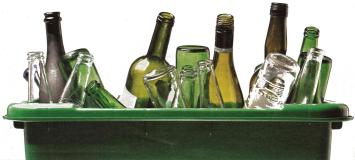How Recycling Could Save You Money
- By Sam Jones
- 18 Jul 2017

How Recycling Could Save Your Money
Recycling isn’t only good for the environment, it’s good for your wallet, too. Recycling saves your household and your business money.
Start recycling by selling any second-hand, working electronics and appliances online. Why throw away your old iPod when you can make £50 off eBay? Even damaged household items needn’t be automatically be consigned to landfill, as recycling is much more than throwing waste away. You can recycle by donating larger household appliances and giving away items to charity can oftentimes be tax deductible. Instead of queuing for hours on a Saturday to tip your washing machine, donate it to a local charity that can fix it and pass it on to another household in need. This effortless path can help lower your tax returns.
As any good business owner will know, economic benefits and rewards are more complex than how many how many more pounds you shave off your expenses every month. Image and brand are a vital part of maintaining and growing a business. Understanding a business’s global and environmental consciousness are a large and continuously growing part of consumer decision-making. Google’s unofficial motto, ‘don’t be evil’ speaks to the awareness that consumers want companies that not only do well, but also do good. Consumers are picking to spend their money on goods and services that have the least detrimental effect on the environment as possible. While good recycling practices may not be the best pick-up line during a date, it’s a great platform for businesses to set themselves apart from competitors.
Recycling is also good for the economy by reducing costs and burdens of collection and disposal. Recycling means more money for individuals and households. Recycling is cheaper than waste collection, landfill and incineration. These lower prices mean less money the community needs to spend, allowing individuals to hold onto their money. If recycling can both help the environment and a cheaper option for your household, there is little dispute that recycling is the way forward.

Recycling pick up, delivery, and even manufacturing accounts for thousands of jobs in the UK. Not only does recycling provide for public sector jobs, such as collection, but also private sector high-end manufacturing jobs. Someone has to build these machines and design ways to build more effective, environmentally-friendly and cheaper ones in the future. So, recycling effectively and well means more employment and greater recycling output.
According to several university studies in the United States, incinerating 10,000 tonnes of waste creates one job, disposing of rubbish in landfills creates six jobs, yet recycling that same 10,000 tonnes of waste creates a significant 36 jobs.
The economic costs of recycling when compared to landfills are also much lower. The many acres used to dump waste cannot be reused or used for other purposes. As communities naturally want landfills as far away as possible, these acres in turn end up in arable farmlands and decrease productivity and economic growth in other sectors. Keeping that land for other, more beneficial uses is the best option to keep the economy afloat.
Recycling keeps prices of goods and services down. As natural resources become more finite, the costs of production and distribution rise. Recycling keeps resources closer and more available, allowing these costs to grow more slowly or remain stable. Moreover, recycling allows the conservation and most effective use of natural resources. Natural resources that produce recyclable items are finite. Recycling allows these natural resources to be used more slowly and more effectively. By recycling waste, we preserve untapped, and increasingly scarce, resources for future economic purposes.















